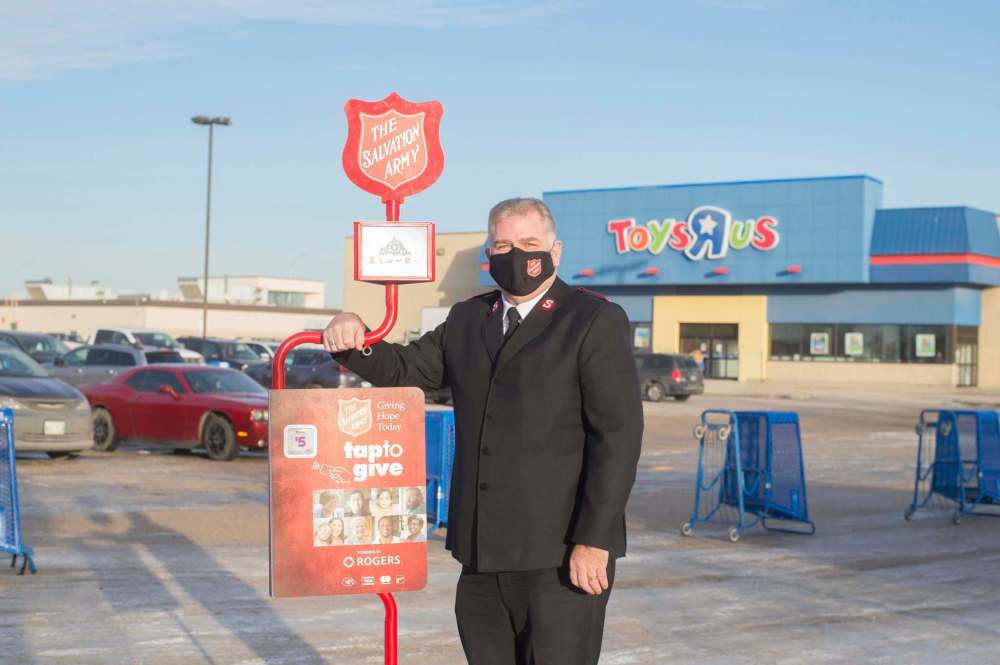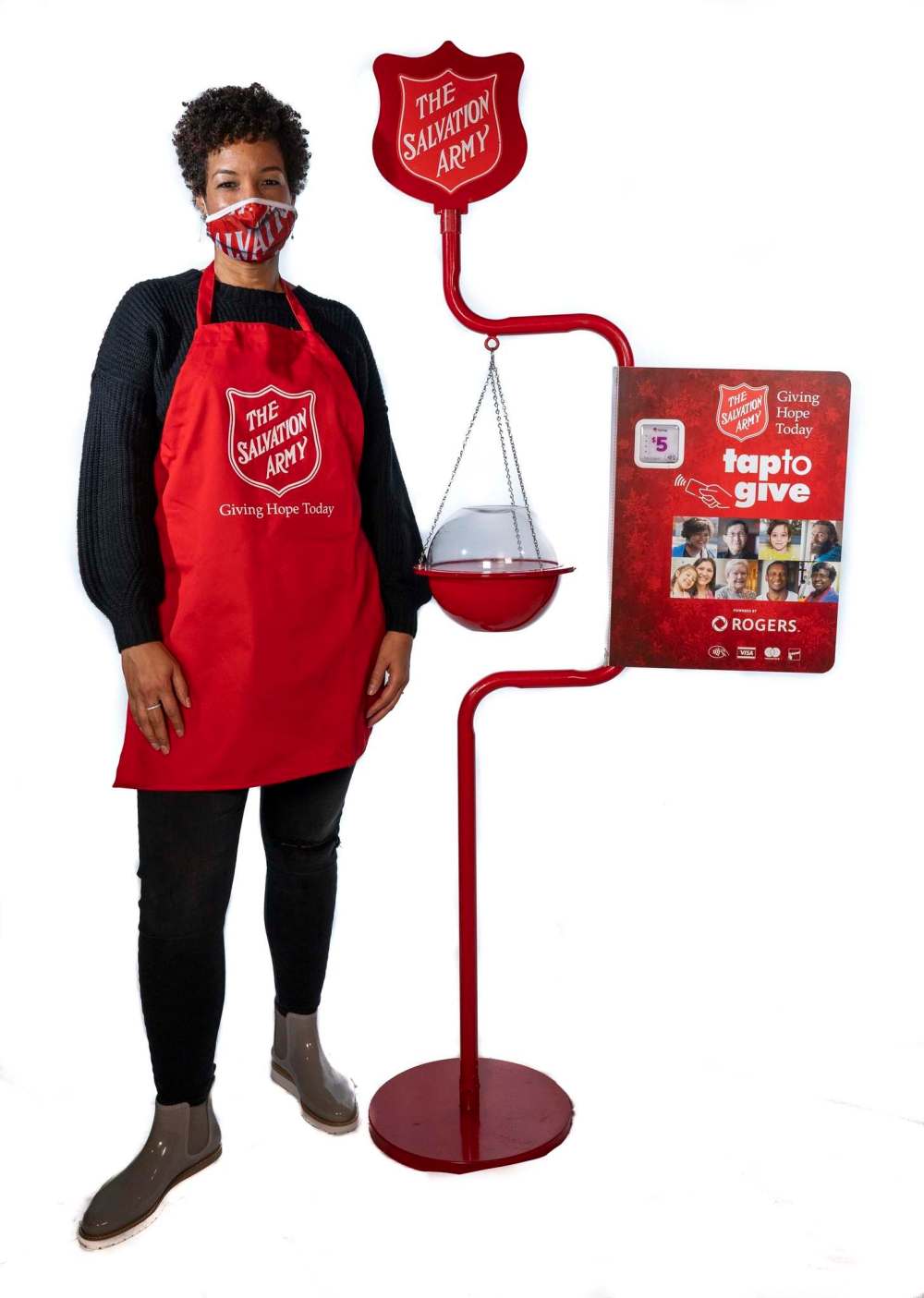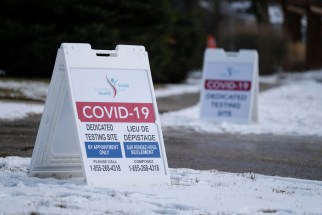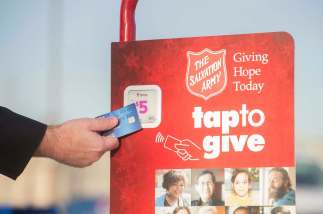Salvation Army kettle campaign rings in new way to give
Read this article for free:
or
Already have an account? Log in here »
To continue reading, please subscribe:
Monthly Digital Subscription
$0 for the first 4 weeks*
- Enjoy unlimited reading on winnipegfreepress.com
- Read the E-Edition, our digital replica newspaper
- Access News Break, our award-winning app
- Play interactive puzzles
*No charge for 4 weeks then price increases to the regular rate of $19.00 plus GST every four weeks. Offer available to new and qualified returning subscribers only. Cancel any time.
Monthly Digital Subscription
$4.75/week*
- Enjoy unlimited reading on winnipegfreepress.com
- Read the E-Edition, our digital replica newspaper
- Access News Break, our award-winning app
- Play interactive puzzles
*Billed as $19 plus GST every four weeks. Cancel any time.
To continue reading, please subscribe:
Add Free Press access to your Brandon Sun subscription for only an additional
$1 for the first 4 weeks*
*Your next subscription payment will increase by $1.00 and you will be charged $16.99 plus GST for four weeks. After four weeks, your payment will increase to $23.99 plus GST every four weeks.
Read unlimited articles for free today:
or
Already have an account? Log in here »
Hey there, time traveller!
This article was published 04/12/2020 (1836 days ago), so information in it may no longer be current.
The Salvation Army’s iconic Christmas Kettle fundraising campaign, put on ice by pandemic restrictions, is being revived by a tiny high-tech device that allows touchless donations.
“This new technology will allow us to have unmanned kettles in safe locations,” said Maj. Jamie Rands, Prairie division secretary for public relations. “It is a tremendous blessing to be able to get something out there to allow donors to help us.
“Because we have not been able to have our kettles physically out in Manitoba, our donations are a fraction of what they would have been at this time in previous years.”

It simply wasn’t safe to have bell-ringing volunteers manning the iconic red kettles in Winnipeg earlier in the COVID-19 pandemic, and it’s prohibited by current code red restrictions, Rands said.
“In code red, they will not allow it because you’re only supposed to have essential workers out there,” he explained.
“We had already made that call prior to code red. A lot of our volunteers are a little bit older and they’re a vulnerable population for COVID-19. We won’t put anyone in a position that could harm them.”
Starting this weekend, the Christian charitable organization hopes to set up unmanned kettle stations at six city Walmart stores that will be equipped with “tiptap” machines, square electronic devices — about half the size of a deck of cards — that allow for touchless donations by tapping it with a credit card, debit card or smartphone.
Would-be donors won’t see smiling volunteers, but rather “our iconic red kettle stands with a sign directing donors to the tiptap machines,” Rands said.
The wireless devices have a pre-set $5 donation for a single tap, but can be tapped up to 10 times for a maximum $50 donation.
Tiptap, a payment-technology firm based in Burlington, Ont., has outfitted about 1,800 kettle stations across the country with its state-of-the-art technology, including 18 in Winnipeg.
The Salvation Army is hoping to get permission to have all of its tiptap stations rolled out before the kettle campaign ends Dec. 24, but currently only has permission to operate at local Walmarts, Rands said.
“We’re just starting to look at where we can do this,” the major said. “We don’t have the buy-in for all the national chains yet. Walmart’s head office has authorized approval; we’re going to begin with them. Some, if not all, will be out there this weekend.

“The hope would be to have all 18 out and utilized soon. We want to have them out there. We have not experienced anything like this in the past. The pandemic is certainly going to hurt our donation bottom line this year.”
Such devices are likely here to stay, Rands said.
“I think it’s going to be the way of the future for us,” he said. “Even when we can have attendants standing at the kettles, we will continue using this touchless technology because so few people are carrying cash in their pockets any longer.”
In a Zoom video call from Burlington, Tiptap chief executive officer Chris Greenfield said the machines “replace cash and coins with a simple and safe touchless giving solution.”
“No one carries cash and coins anymore, so charities have suffered significantly, and COVID-19 has amplified that,” he said.
“It’s going to really increase collections for them. There’s no issues with cash handling or theft, and it’s a simple giving experience. There’s fewer barriers for people to give… In COVID-19 times, it’s definitely safer because there’s no touching of screens or risk of transmission of the virus.”
The Salvation Army kettle campaign also represents the first national test for the company founded in 2018.
“I’m hoping it helps to increase donations for them and allows them to help those who need help more than ever,” Greenfield said. “Our success is tied to the success of the Salvation Army collections and the people they’re able to help.
Help fill the kettle
The Salvation Army normally has about 40 of its iconic red Christmas kettles scattered around Winnipeg, but pandemic protocols have put the campaign on ice.
This weekend, however, donors can access six unmanned kettle stations outfitted with electronic touchless donation devices they can tap with a credit card, debit card or smartphone.
The Salvation Army normally has about 40 of its iconic red Christmas kettles scattered around Winnipeg, but pandemic protocols have put the campaign on ice.
This weekend, however, donors can access six unmanned kettle stations outfitted with electronic touchless donation devices they can tap with a credit card, debit card or smartphone.
You can also donate online at fillthekettle.com, salvationarmy.ca, or by calling 1-800-SAL-ARMY (725-2769).
Holiday moments
Manitobans are preparing to celebrate a holiday season unlike any other in memory. We’d like you to share your stories of people going above and beyond to celebrate the season amid a pandemic.
Share them with columnist Doug Speirs at doug.speirs@freepress.mb.ca

“Without this, they probably would have had a tough fundraising season. This at least helps reduce the impact COVID-19 is having on the charity.”
The charity needs the devices because the pandemic has been a double whammy by making it harder to raise money while increasing the demand for Salvation Army food and shelter programs, Rands said.
“People are having a really hard time putting food on their own tables, let alone helping others,” the major said. “But we are here for those people. We are here for anyone in need. We are seeing up to five times the demand of what we’ve seen in previous years.
“We have not seen numbers like this year since the end of the Second World War. We’ve got people coming to see us who have never come before. Some are embarrassed to seek help, but that’s why we are here.”
doug.speirs@freepress.mb.ca

Doug has held almost every job at the newspaper — reporter, city editor, night editor, tour guide, hand model — and his colleagues are confident he’ll eventually find something he is good at.
Our newsroom depends on a growing audience of readers to power our journalism. If you are not a paid reader, please consider becoming a subscriber.
Our newsroom depends on its audience of readers to power our journalism. Thank you for your support.







